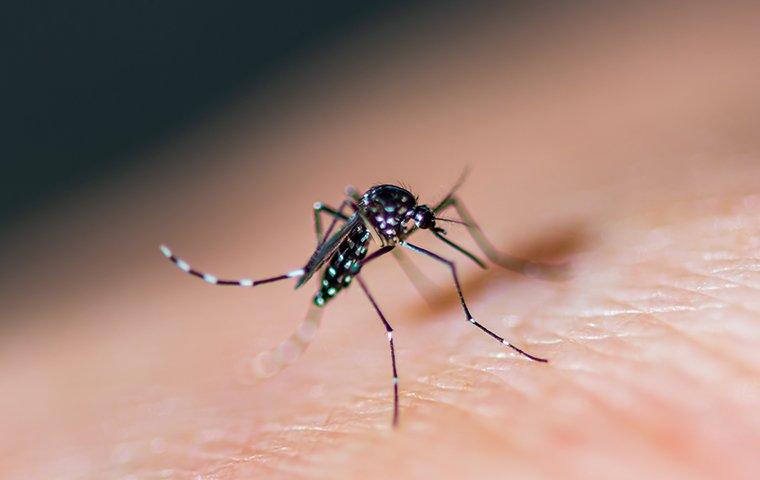Mosquitoes play a vital role in our ecosystem. They serve as a food source for birds, bats, and many other animals. Their larvae filter organic matter in stagnant water, recycle nutrients, and indirectly affect plant diversity. But while they are essential in many ways, they are also incredibly problematic if they settle on our properties.
Mosquitoes are a pervasive problem in Illinois for much of the year. These tiny, parasitic insects bring many issues, from health risks to painful bites, and can disrupt outdoor events like nobody's business. No one wants to spend time and money organizing a backyard party or celebration and end up spending it swatting at nuisances like mosquitoes.
One of the primary concerns in St. Charles is the transmission of diseases like West Nile. Unlike malaria, which you might find in tropical and subtropical regions, it is a prominent threat in the area, and there have even been fatalities in recent years. Our standing water sources, like wetlands and rivers, provide ideal breeding grounds for these biting pests. And our warm and humid summers create perfect conditions for their proliferation. Even a birdbath, clogged gutter, or rain-filled tire can cause them to start an infestation on your property.
Even if there were no risk of diseases, mosquitoes can ruin your barbecues and will make gardening a nightmare. And if they come inside your home, you can say goodbye to peaceful nights and restful sleep. Still, while mosquitoes in Illinois are no joke, plenty of strategies remain to keep them at bay.
In this article from the PCC experts, we will explain how mosquito bites happen and why they itch before reviewing the potential health risks they carry. We will also give practical prevention tips to protect yourself and your loved one from these unwanted guests to complement professional mosquito control in St. Charles.

The Anatomy Of A Mosquito Bite: How It Happens And Why It Itches
Have you ever wondered what happens beneath the surface when a mosquito feasts on your blood? If so, we've got answers for you.
After a mosquito lands on your skin, it uses a straw-like appendage (called a proboscis) to pierce it. This process is surprisingly painless because a mosquito's saliva contains an anesthetic to prevent you from detecting it.
Once the proboscis is in place, that's when the feeding starts. Mosquitoes use their specialized mouthparts to search for blood vessels. When they're successful, they begin drawing up your blood while injecting anticoagulants to ensure the blood remains liquid and doesn't clot. You might not feel a thing up to this point.
As the mosquito feeds, your body will detect foreign substances in its saliva. It will immediately go into defense mode, releasing histamines to help fight off this winged aggressor. These chemicals are the reason for the itching sensation, but they are also necessary to allow white blood cells to reach the area and combat potential infections.
Finally, you will typically get a raised, red bump. It is a combination of inflammation and the mosquito's saliva. Your immune response causes the spot to swell, and the irritation from the bite compounds the discomfort. At this stage, you might feel like scratching. It is a natural response to the itching. Unfortunately, the more you do it, the more your body releases histamines, making everything worse. The bite could also become infected if you break the skin.
Topical treatments like over-the-counter antihistamine creams or calamine lotion can help make you feel better. Oral antihistamines may also help reduce itching and swelling. Please ask your doctor about recommended strategies if necessary, and always contact them if you suspect you are developing an infection.
In the end, preventing mosquito bites in the first place through prevention strategies and professional help is the best way to avoid these issues altogether. They will also help prevent the transmission of dangerous diseases.
Mosquito Bite Dangers: The Potential Health Risks
Mosquitoes are known for transmitting diseases like malaria, which are relatively rare in Illinois. Still, their bites can pose many health risks.
Here are some of the main problems and diseases spread by mosquitoes that you might face if you have an infestation on your property:
- West Nile virus: Illinois has experienced outbreaks of West Nile virus and even fatalities. This virus can cause anything from a fever to neurological illness.
- St. Louis encephalitis: Despite somewhat low contamination rates, St. Louis encephalitis is still a concern. It can also cause a mild fever but could progress to severe encephalitis.
- LaCrosse encephalitis: This viral disease comes from the Aedes mosquito. You can find this species in the upper Midwest, including parts of Illinois. Children are the primary target. They could suffer neurological complications, making prevention efforts essential.
- Secondary infections: Excessively scratching mosquito bites can break the skin and potentially introduce bacteria. Keeping mosquito bites clean to prevent secondary infections is always a good idea. Washing the area with soap and water, drying carefully, and applying doctor-recommended calming creams can help with the discomfort.
Taking proactive measures to avoid mosquito bites is an excellent way to reduce the risk of these diseases. Read on for practical tips to keep these dangerous buzzing pests at bay, and call the pros if you need help getting started.
Bite Prevention Tips: Protecting Yourself From Mosquitoes
Mosquitoes are more than annoying. As you can see, they can also pose health risks by transmitting diseases. But while they are prevalent in St. Charles, you can still keep your loved ones safe from these buzzing pests.
Here are some essential bite-prevention tips to help you minimize their numbers around your property and keep mosquitoes away:
- Ask us about mosquito repellents. Many over-the-counter products are available to keep mosquitoes off your skin. Depending on your preferences, they can contain anything from DEET to essential oils. Apply them to exposed skin and clothing and reapply as necessary. While they create a barrier that makes you less appealing to these blood-feeding insects, preventing infestations in the first place is always the best strategy.
- Wear protective clothing. Covering exposed skin with long-sleeved shirts, pants, and socks is another fundamental strategy for bite prevention. Mosquitoes naturally find it harder to bite through clothing. There is some evidence that light colors are also less attractive to these buzzing nuisances.
- Avoid peak mosquito activity times. Dawn and dusk are the worst times to be outside if you struggle with a mosquito problem. Planning outdoor events outside of these peak activity hours is best. Otherwise, we recommend you take extra precautions to protect yourself or consider professional treatments to eliminate the issue.
- Eliminate breeding sites. Remember that mosquitoes lay their eggs in stagnant water. Regularly remove breeding sites, including containers like flowerpots and buckets, to reduce the mosquito population. Clean gutters often, and change the water in bird baths weekly. As surprising as it sounds, mosquitoes need nothing more than a capful of water to reproduce.
- Use mosquito screens and fans. Consider fitting your doors and windows with fine-mesh screens to prevent mosquitoes from entering your home and ruining your sleep with their bites and buzzing noises. Fans can also help keep them away from you as they are weak flyers who struggle when faced with wind and air currents.
- Keep your grass trimmed. Mosquitoes can't withstand the harsh daytime sun. As a result, they rely on hiding spots like overgrown vegetation and tall grasses to protect themselves until dusk.
Taking proactive steps to prevent mosquito bites is crucial but can be insufficient due to the many factors in the area that can lead to infestations.
Using professional mosquito treatments and additional prevention strategies, PCC can help reduce your risk of mosquito bites and their potential health risks.
Say Goodbye To Mosquito Bites Around Your Yard: Call Us Today!
If you are tired of battling mosquito bites in your yard, we can help with top-rated solutions for mosquito control in St. Charles and surrounding areas. Our comprehensive mosquito control services also target other common yard nuisances like fleas, ticks, and ants. We use environmentally conscious products that deliver immediate results, eliminating mosquitoes at all life stages and preventing them from returning by disrupting their breeding cycles.
Our proven process begins with a thorough inspection of your property to identify breeding and resting sites. We will treat these areas with our specialized backpack misting system to eliminate both adult mosquitoes and their eggs. You can choose between one-time treatments for special outdoor events or monthly services for year-long protection. We also provide expert advice to keep mosquito populations in check between treatments.
Don't let mosquitoes ruin your summer. Call PCC today to create a strategy tailored to your property.
Mosquitoes are a persistent issue in Illinois. They can transmit diseases and cause painful bites. The PCC experts can help keep them at bay with prevention strategies like eliminating breeding and resting sites and safe and effective mosquito treatments like backpack misting. Call us today to learn more.
 Customer Reviews
Customer Reviews
